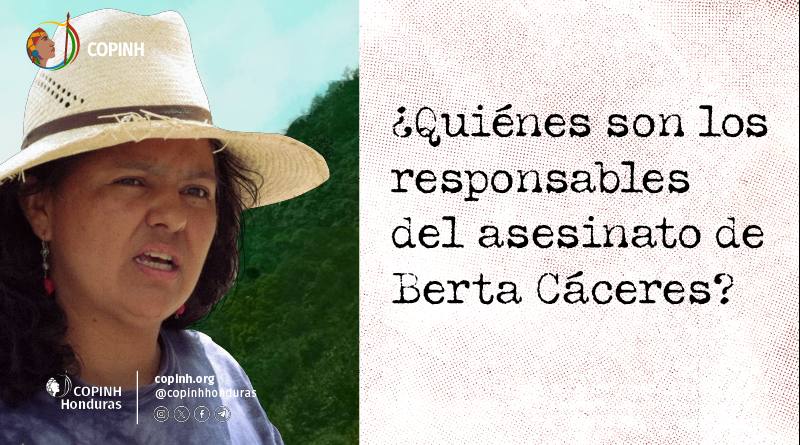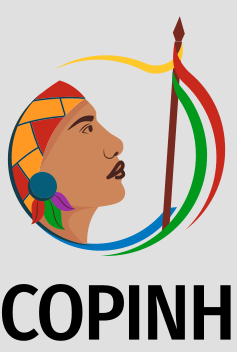(English below)
En los nueve años de lucha por justicia, se han identificado tres grandes grupos de responsabilidad en el asesinato de Berta Cáceres: el Estado de Honduras, autores materiales y empresas privadas.
Responsabilidad del Estado Miembros del Ejército hondureño participaron directamente en el asesinato de Berta Cáceres, entre ellos:
- Douglas Bustillo: trabajaba en seguridad para DESA
- Mariano Díaz: era un mayor activo del Ejército.
Además, diversas instituciones del Estado favorecieron la aprobación ilegal del proyecto hidroeléctrico Agua Zarca, que generó conflictos en la comunidad de Río Blanco. Funcionarios del Congreso Nacional, la Secretaría de Recursos Naturales y la Empresa Nacional de Energía (ENEE) incumplieron su deber de proteger a la comunidad y permitieron la expansión del proyecto. También fuerzas de seguridad hostigaron e intimidaron a la comunidad y a Berta Cáceres antes de su asesinato.
Grupos armados ilegales Una estructura criminal bajo el mando de miembros del Ejército fue responsable de la ejecución del asesinato. Este grupo operó con acciones previas de vigilancia, persecución e identificación de los movimientos de Berta Cáceres. En los juicios llevados a cabo, se condenó a integrantes de este grupo criminal, incluyendo sicarios y miembros del Ejército que participaron en la operación.
Hasta la fecha, estos ocho individuos han sido enjuiciados y condenados en Honduras. En la base de esta estructura se encuentran cuatro sicarios:
- Henri Hernández
- Oscar Torres
- Elvin Rapallo
- Edinson Duarte.
Ellos fueron quienes ingresaron a la vivienda de Berta Cáceres y ejecutaron el crimen. En un nivel intermedio, se encuentran ex-militares que coordinaron el asesinato y contrataron a los sicarios
Más arriba en la jerarquía, se ubican
- Sergio Rodríguez: realizó labores de vigilancia y seguimiento a Berta Cáceres, proporcionando información clave para el asesinato.
- David Castillo: empleado de la familia Atala Zablah, actuó como intermediario entre los autores materiales y la cúpula empresarial que ordenó el crimen.
Responsabilidad empresarial Los responsables intelectuales del asesinato de Berta Cáceres pertenecen al sector empresarial. La empresa Desarrollos Energéticos S.A. (DESA), dirigida por la familia Atala Zablah, tomó la decisión de perseguir a la activista debido a su oposición al proyecto Agua Zarca. Entre los empresarios implicados se encuentran:
- Eduardo Atala
- Pedro Atala
- Jacobo Atala.
Además, instituciones financieras internacionales que financiaron el proyecto, permitiendo la expansión del conflicto y la violencia contra la comunidad de Río Blanco y el COPINH:
- Banco Centroamericano de Integración Económica (BCIE)
- Banco Mundial
- FMO de Holanda
Actualmente, está pendiente el enjuiciamiento de la estructura de mando superior. Un personaje clave es:
- Daniel Atala Midence: gerente financiero de DESA, sobre quien pesa una orden de captura. Su papel en el crimen incluye el financiamiento de acciones previas al asesinato y la comunicación con otros implicados. La investigación debe determinar si él también participó en la toma de la decisión de asesinar a Berta Cáceres.
Proceso judicial y condenas
Hasta 2024, se han llevado a cabo dos juicios clave en Honduras por el asesinato de Berta Cáceres. En el primer juicio, celebrado en 2018, fueron condenados siete autores materiales e intermediarios del crimen, incluyendo a los sicarios Henri Hernández, Oscar Torres, Elvin Rapallo y Edinson Duarte, así como a los exmilitares Douglas Bustillo y Mariano Díaz, y al ejecutivo de DESA Sergio Rodríguez. En 2022, David Castillo, gerente de DESA y principal intermediario entre los sicarios y la cúpula empresarial, también fue sentenciado.
Además, se han abierto investigaciones y procesos legales contra funcionarios del Estado hondureño por corrupción y abuso de autoridad, debido a su papel en la aprobación irregular del proyecto hidroeléctrico Agua Zarca y la omisión de medidas de protección para Berta Cáceres, pese a las amenazas en su contra.
A nivel internacional, en Holanda, el Banco FMO enfrenta acciones legales por su responsabilidad en la financiación de DESA, dado que mantuvo su apoyo económico al proyecto a pesar de las denuncias de violaciones a los derechos humanos y la violencia ejercida contra la comunidad Lenca. Estas acciones han abierto un precedente sobre la responsabilidad de las instituciones financieras en conflictos socioambientales.
El asesinato de Berta Cáceres fue una decisión tomada desde el sector empresarial, con la colaboración de estructuras del Estado y grupos armados ilegales. La oposición de Berta y del COPINH al proyecto Agua Zarca afectaba intereses económicos, lo que llevó a su asesinato. La lucha por justicia sigue, exigiendo la identificación y condena de todos los responsables, incluyendo a los autores intelectuales que aún no han sido juzgados.
Who is Responsible for the Murder of Berta Cáceres?
Nine years into the pursuit of justice, responsibility for the murder of Berta Cáceres has been attributed to three main groups: the Honduran State, the direct perpetrators, and private companies.
State responsibility
Members of the Honduran military were directly involved in Berta Cáceres’ murder, including:
- Douglas Bustillo – a former military officer who worked as head of security for DESA.
- Mariano Díaz – an active-duty major in the Honduran Army at the time of the crime.
In addition to their direct involvement, several state institutions played a key role in enabling the Agua Zarca hydroelectric project, which triggered conflict in the Río Blanco community. Officials from the National Congress, the Ministry of Natural Resources, and the National Electric Energy Company (ENEE) violated their duty to protect the community and instead paved the way for the project’s expansion. State security forces also harassed and intimidated both Berta Cáceres and the Río Blanco community prior to her assassination.
Illegal armed groups
A criminal network, operating under the direction of military officials, carried out the murder. This group conducted surveillance and tracking of Berta Cáceres’ movements before executing the crime. During a trial in 2018, several members of this network—including hired hitmen and military officers—were convicted.
To date, eight individuals have been prosecuted and convicted in Honduras. At the lowest level of the criminal structure were four hitmen who broke into Berta Cáceres’ home and carried out the assassination:
- Henri Hernández
- Oscar Torres
- Elvin Rapallo
- Edinson Duarte
Former military personnel who were higher-ranking actors in the criminal structure f coordinated the operation and hired the hitmen.
Higher up in the chain of command were:
- Sergio Rodríguez: a DESA executive who carried out surveillance and provided key information used in the planning of the assassination.
- David Castillo: An employee of the Atala Zablah family, he acted as an intermediary between the perpetrators and the business leaders who ordered the crime.
Corporate responsibility
The crime was orchestrated by actors within the private sector.“Desarrollos Energéticos S.A. (DESA)”, a company under the control of the Atala Zablah family, made the decision to eliminate Berta Cáceres in retaliation for her opposition to the Agua Zarca project. The businessmen involved are:
- Eduardo Atala
- Pedro Atala
- Jacobo Atala
The prosecution of the upper-level command structure remains pending. One key figure is:
Daniel Atala Midence, DESA’s financial manager, who is the subject of an arrest warrant. His role in the crime includes funding the actions that led up to the assassination and communicating with other co-conspirators. Ongoing investigations must determine whether he was also involved in the decision to have Berta Cáceres killed.
International financial institutions also bear responsibility for funding the project, thereby contributing to the escalation of violence against the Río Blanco community and COPINH. These include:
- Central American Bank for Economic Integration (CABEI)
- World Bank Group
- FMO (Netherlands Development Bank)
Legal Proceedings and Convictions
As of 2024, two major criminal trials have been held in Honduras in connection with the murder of Berta Cáceres. In 2018, seven individuals were convicted—including the four hitmen, ex-military officers Douglas Bustillo and Mariano Díaz, and DESA executive Sergio Rodríguez. In 2022, DESA manager David Castillo was also sentenced for acting as the link between the gunmen and the corporate executives behind the crime.
Additional investigations and legal proceedings have been launched against Honduran public officials for corruption and abuse of authority, due to their role in illegally approving the Agua Zarca project and their failure to protect Berta Cáceres despite multiple threats.
At the international level, the Dutch development bank FMO is facing legal action in the Netherlands for its role in financing DESA, having continued its support despite well-documented reports of human rights abuses and violence against the Lenca community. This case is setting an important precedent for holding financial institutions accountable in socio-environmental conflicts.
Berta Cáceres was murdered as a result of a decision made by corporate executives, in collusion with state structures and illegal armed groups. Berta and COPINH’s resistance to the Agua Zarca project threatened powerful economic interests. The fight for justice continues, demanding the prosecution and conviction of all those responsible—including the intellectual authors who have yet to face justice.




